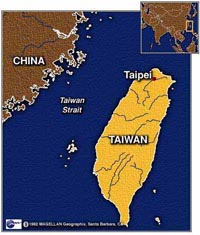U.S. trade official urges Taiwan to lift restrictions on trade with China
The deputy U.S. trade representative on Friday called on Taiwan to lift its restrictions on trade with rival China, saying the island was putting its own businesses at a disadvantage. Karan Bhatia, the highest ranking American official to visit Taiwan in six years, arrived Wednesday for two days of talks with Taiwanese officials on trade issues including pharmaceuticals, intellectual property rights, agriculture and telecommunications.

Earlier Friday, he rejected an appeal from President Chen Shui-bian to begin negotiations on a free trade agreement between Washington and the self-governing island, saying congressional restrictions prevented the administration from beginning a new round of FTA talks. Speaking to the American Chamber of Commerce in Taipei on the question of Taiwan-China trade ties, Bhatia said that Taiwanese restrictions on economic exchanges with the mainland were harming its own economy. Taiwan and China split amid civil war in 1949. Since then Beijing has used a blend of threats and diplomacy to try to bring the island back into its fold.
While economic exchanges between the sides resumed in the early 1990s, Chen's independence leaning government has resisted tightening links, fearing that over-dependence on its giant neighbor would restrict Taiwanese wiggle room in the event of a future confrontation. In his remarks to the American chamber, Bhatia specifically criticized Taiwan's restrictions on technology transfers and investment in China, travel to Taiwan by Chinese employees of multinational firms, and the absence of direct transportation links between the two sides.
The restrictions "combine to create uncertainty as well as a distinctive competitive disadvantage for Taiwan," he said, adding that they deter multinational companies from investing on the island. Bhatia also poured cold water on the idea of negotiations on a free trade agreement between Taiwan and the United States, which Chen brought up during their meeting earlier in the day.
The Taiwanese leader said the close economic relations between the two bilateral trade in 2005 was US$57 billion (euro45 billion) made an FTA desirable. "Since trade and economic exchanges between Taiwan and the U.S. are important, the U.S.-Taiwan free trade agreement shouldn't be delayed," he said. However, Bhatia said the time was not right for the initiation of free trade talks between Taipei and Washington.
"The challenge we face is our trade negotiation authority given by our Congress expires in July next year, which is a short period of time and makes it a real challenge to start new FTA talks," he said.
The visit follows a period of political tension between Taiwan and the United States, its main ally. In February, Chen scrapped a government body responsible for overseeing Taiwan's eventual reunification with China. The move provoked anger in mainland China and consternation in Washington. As Taipei's main ally, the U.S. is concerned that it might be dragged into a military conflict across the Taiwan Strait, reports the AP.
N.U.
Subscribe to Pravda.Ru Telegram channel, Facebook, RSS!


